From Dr. Susan Crockford’s Polar Bear Science
Posted on July 27, 2020
In something resembling a new pattern for Western Hudson Bay polar bears, most of the animals are still out on the ice in late July this year, just like they were in the 1980s. The same thing happened last year but was brushed off as a happy anomaly. However, after last fall’s 1980s-like early freeze-up, this makes the sixth year in a row of good to very good sea ice conditions for Western Hudson Bay polar bears. No wonder polar bear experts haven’t published these data: good sea ice conditions along with polar bears coming ashore fat and healthy are not just inconvenient – they threaten to destroy the extinction panic narrative that depends on Western Hudson Bay bears showing evidence of harm from reduced sea ice.
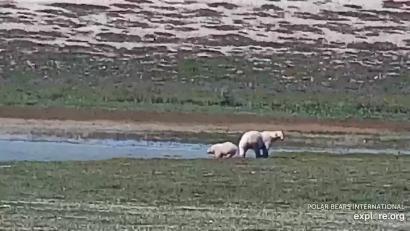
Perhaps the first bear off the Western Hudson Bay ice came ashore just south of Churchill in Wakusp National Park (at ‘Cape East’), 13 July 2020, courtesy Explore.org livecam and was in very good condition.
The first of polar bear researcher Andrew Derocher’s collared bears was reported off the ice on 17 July. A week later (24 July), he reported that only three of his 14 collared WH females had come ashore (see map below).
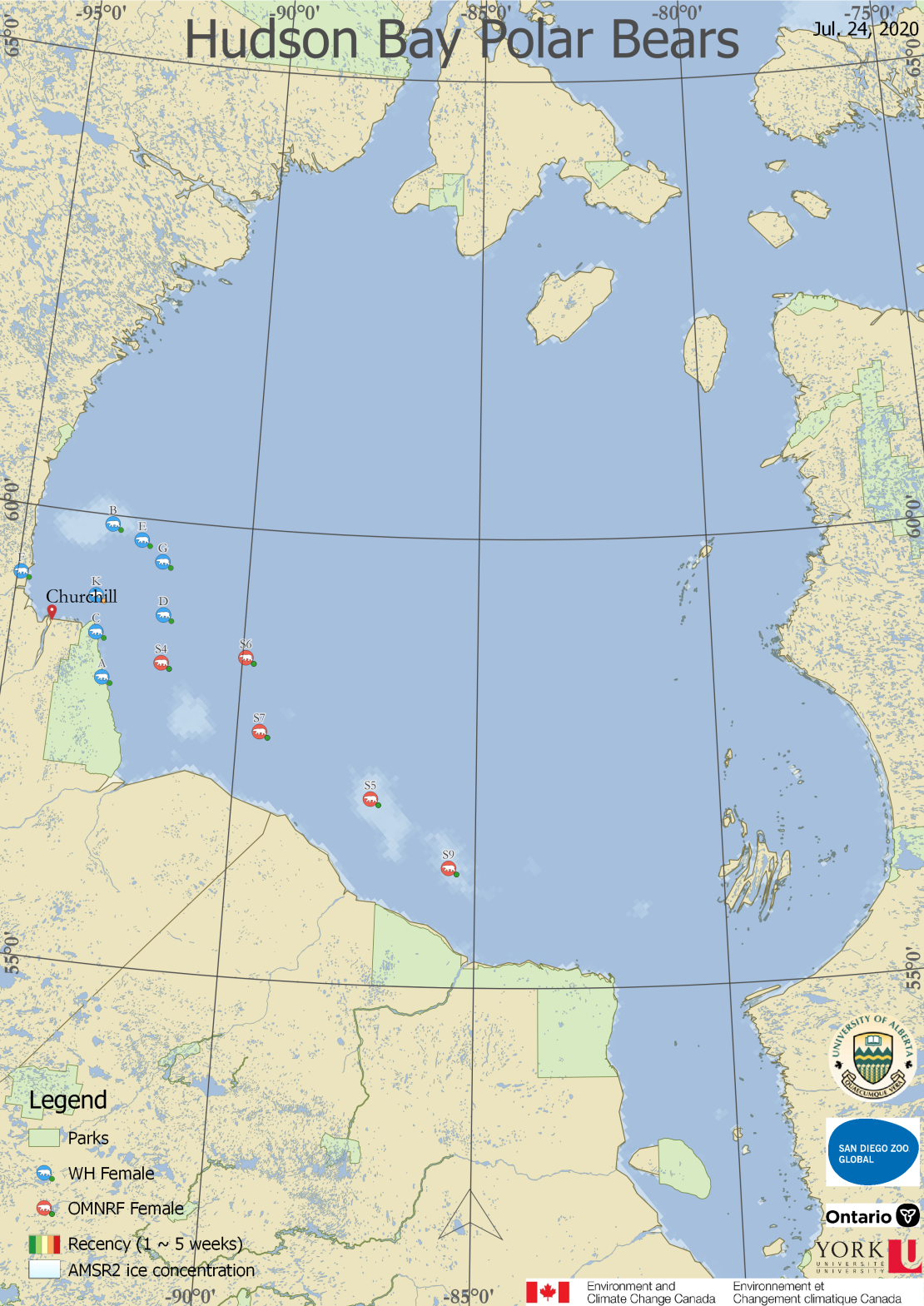
There was actually far more ice over Hudson Bay on 24 July than the map Derocher presents above because he uses ice charts that display only ice >50% concentration. The Canadian Ice Service extent of ice cover (below) shows ice >15% concentration and explains the tagged bears that appear on Derocher’s map to be in open water:
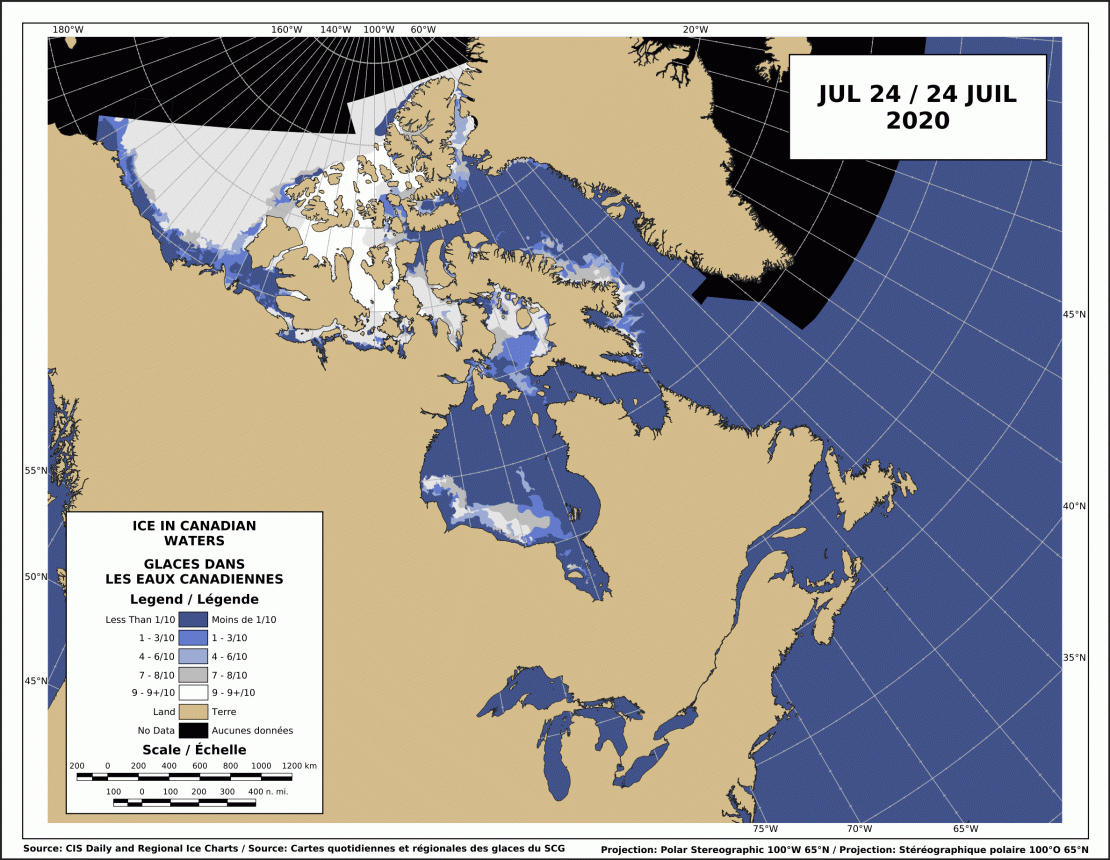
Stage of development charts for the NW sector below show that the remaining ice is thick first year ice > 1.2m thick (dark green):
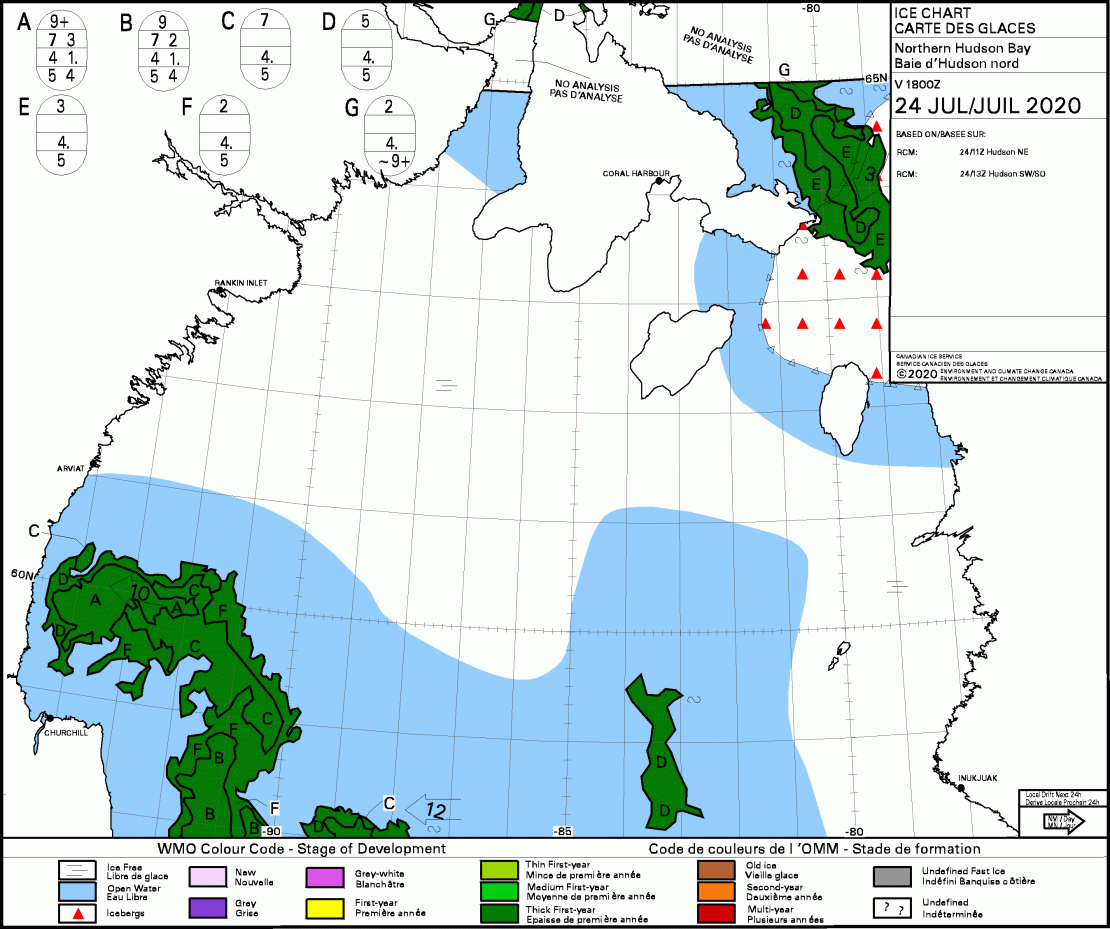
The pattern of ice retreat over Hudson Bay this year is remarkably similar to the average for 1971-2000 (see below) calculated by Ian Stirling and colleagues in support of their claim that earlier breakup of sea ice caused by global warming threatens the future survival of Western Hudson Bay polar bears (Stirling et al. 2004):
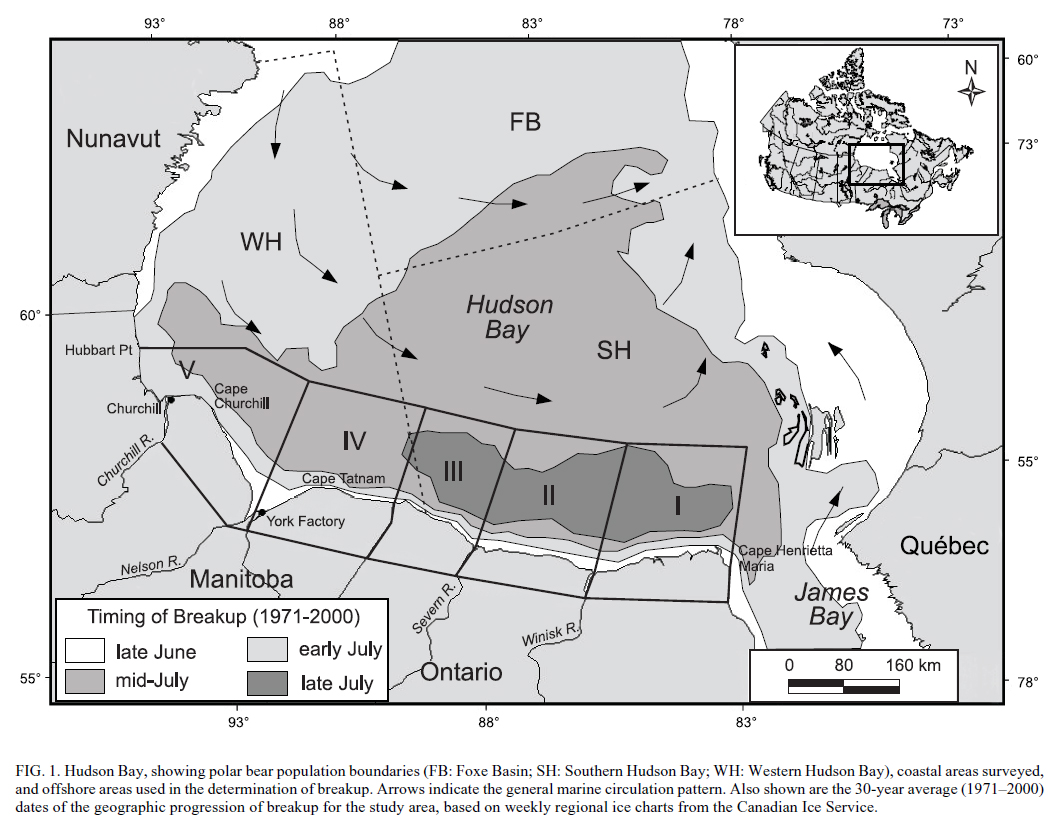
Below is the mid-July weekly sea ice thickness chart for 2020 showing the overall pattern of ice comparable to the medium grey area in the above figure (note the CIS chart below is rotated clockwise relative to the figure above), where the dark green is thick first year ice >1.2m:
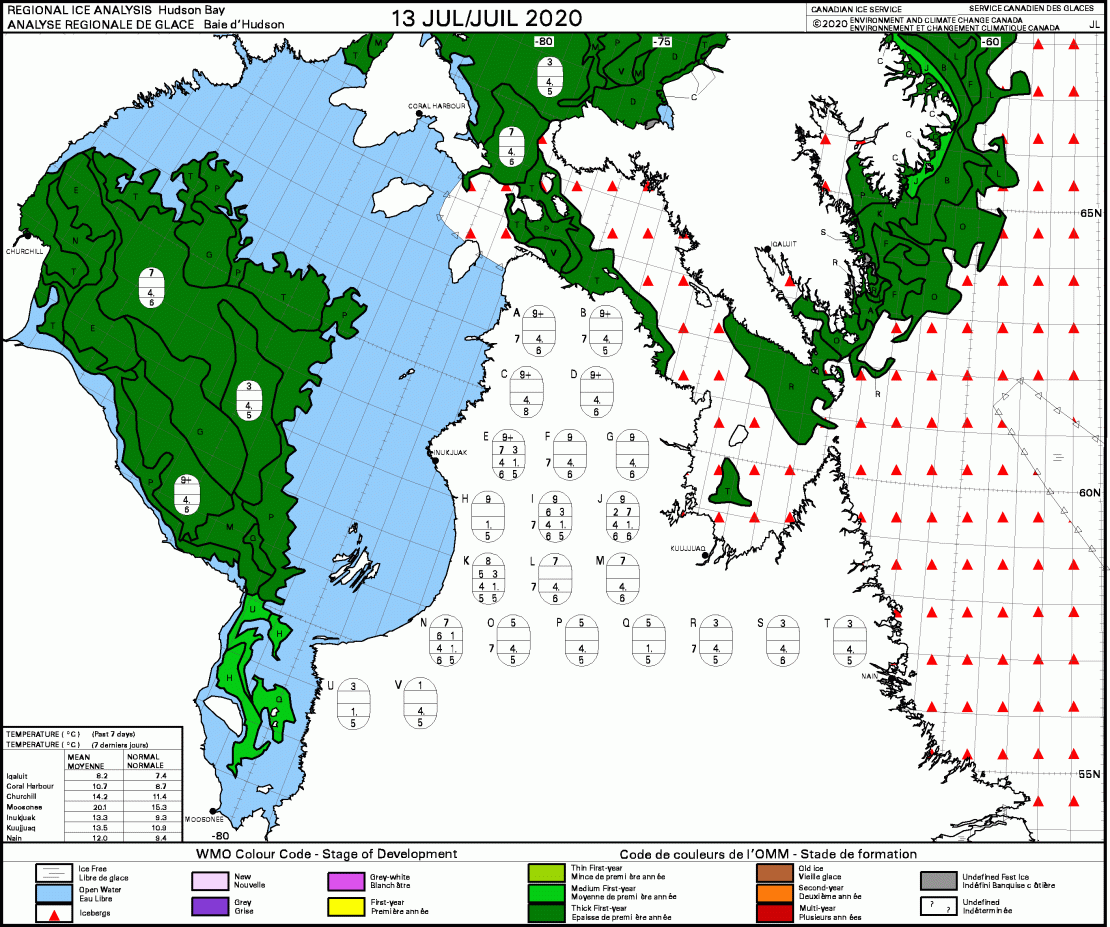
Not since 2009 has there been quite so much thick ice so close to shore at mid-July (below). Polar bears were not off the ice until August in 2009 and were reportedly in good condition and abundant in the area around Churchill.
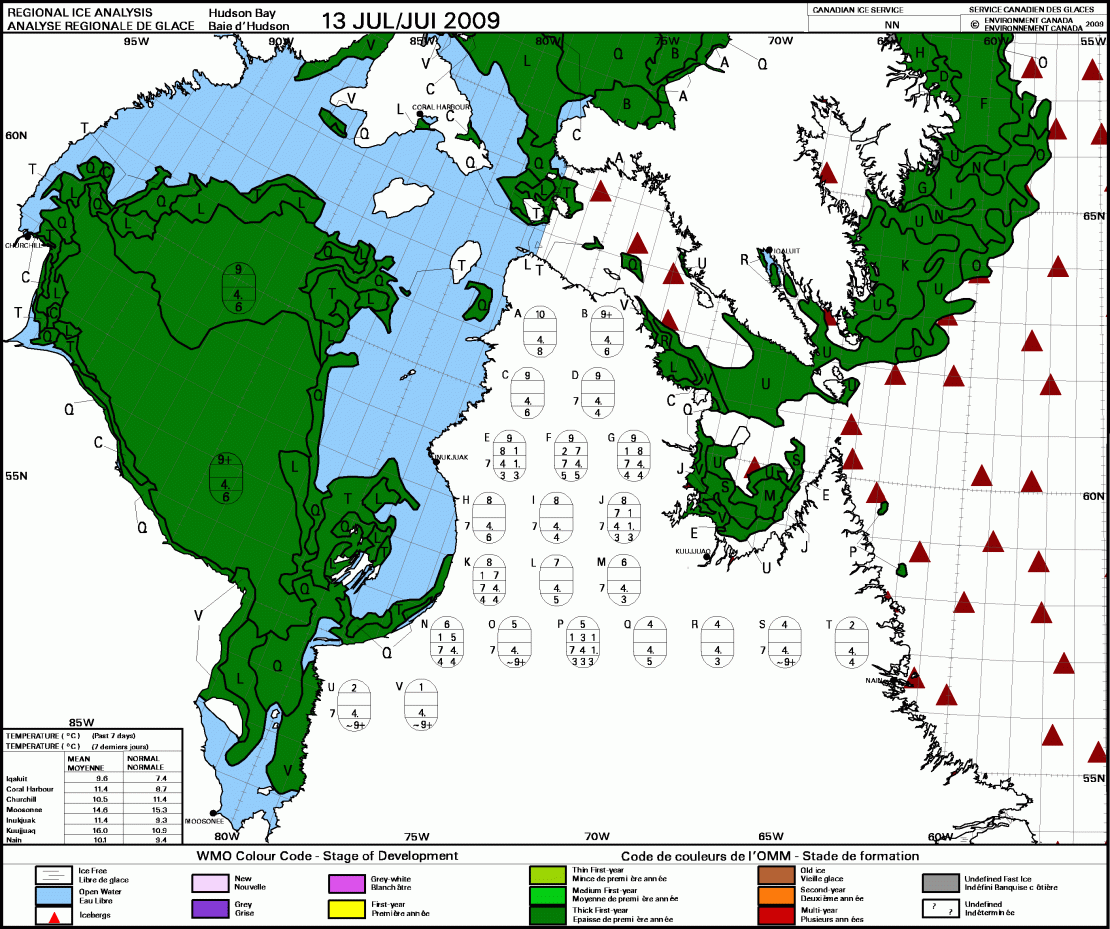
Except perhaps for 2019, which had almost as much:
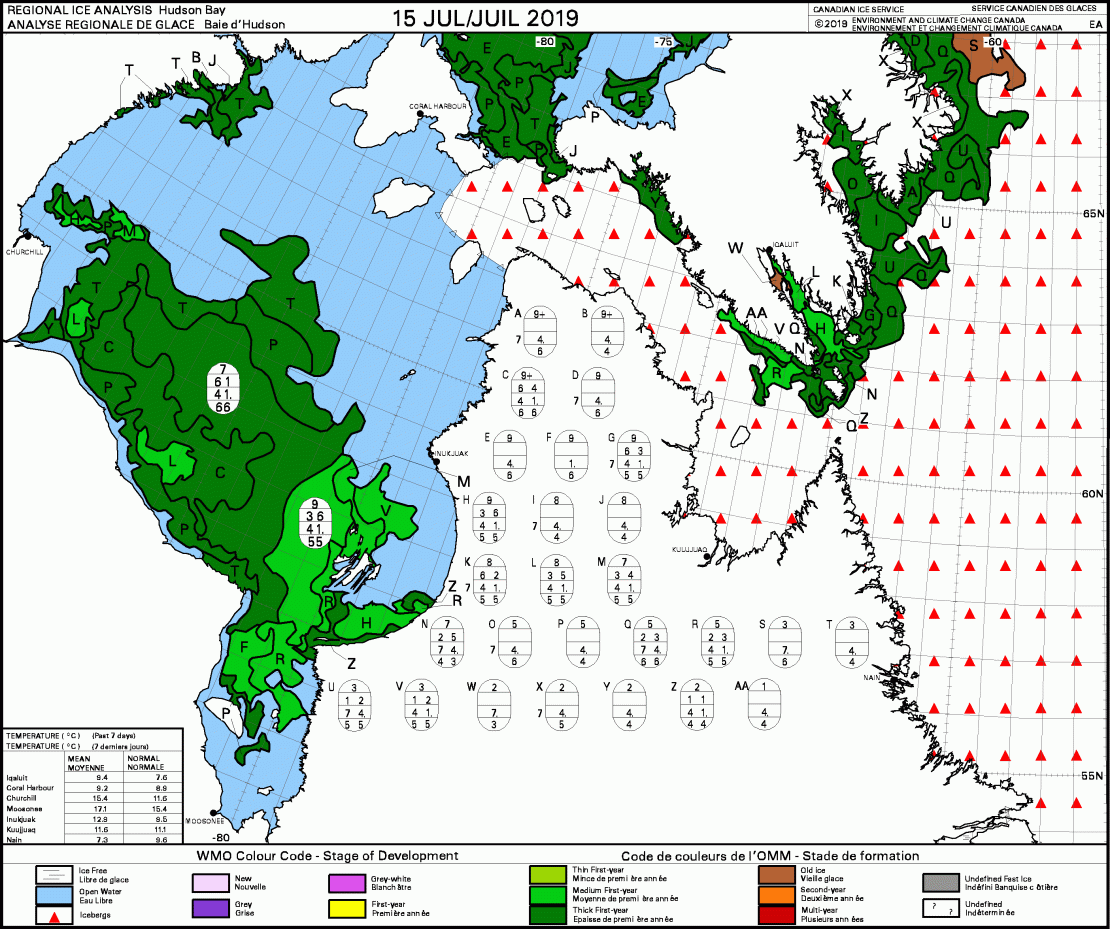
In 2018, there was still quite a bit of ice but it was more centrally located:
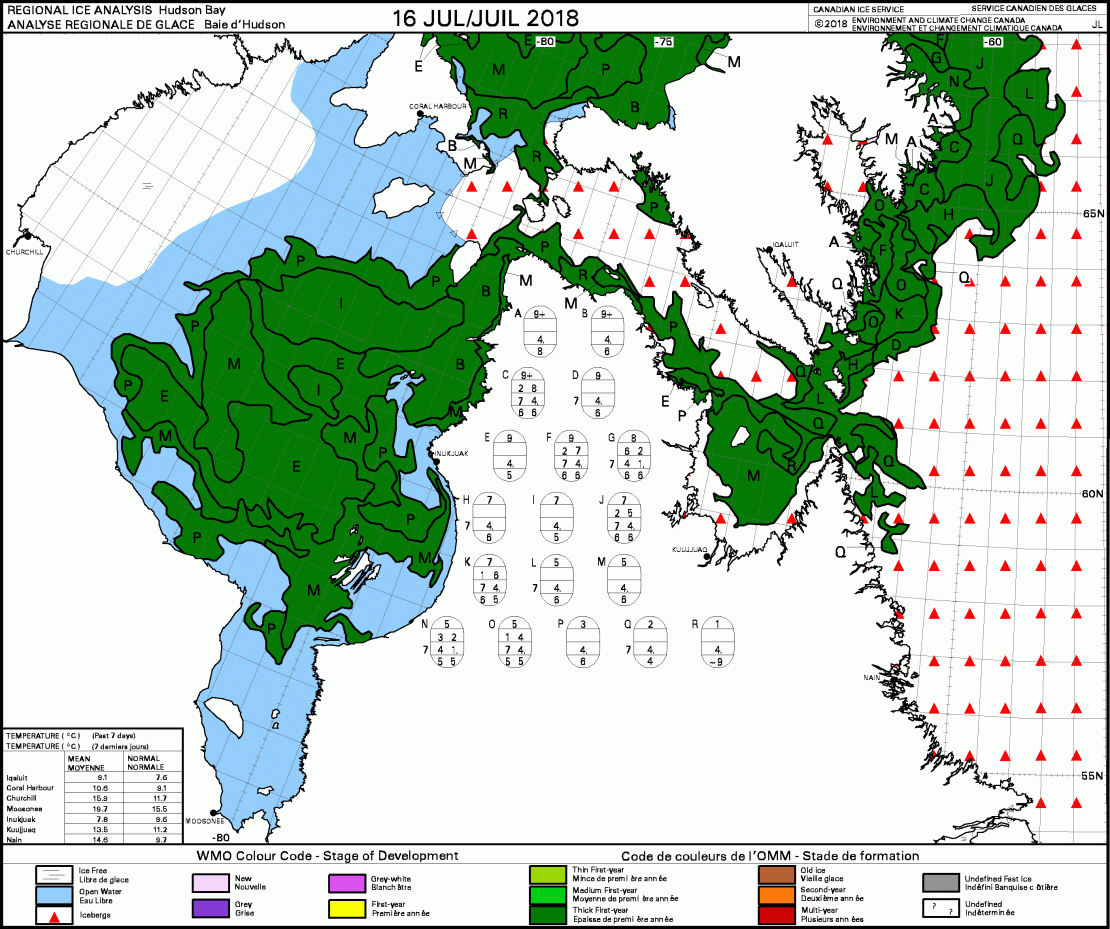
A search of the CIS archives shows there was enough for some bears to stay on the ice into July from at least 2015. In 2019, Derocher’s collared bears were as late coming off the ice as they have been this year, with many still on the ice as of 27 July (see below).
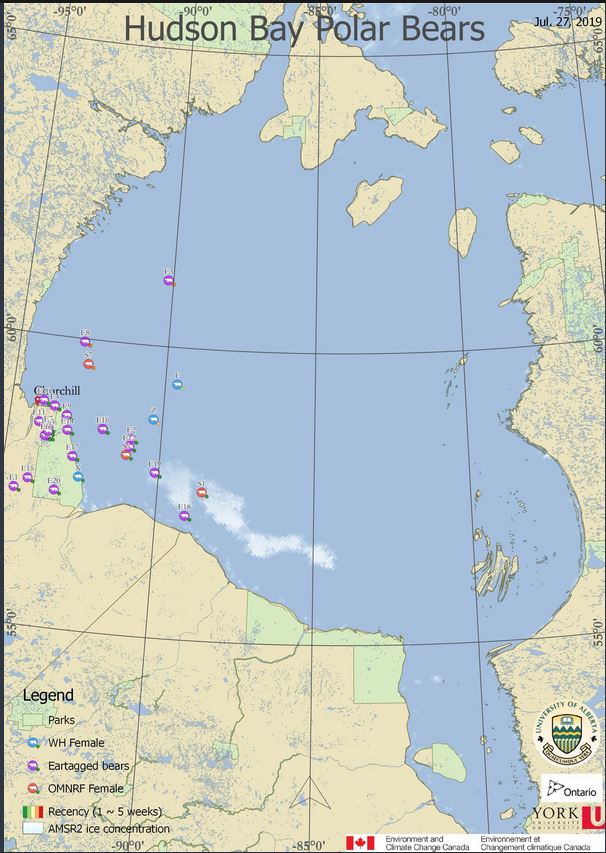
In other words, this is not the first 1980s-like breakup year for Western Hudson Bay polar bears in recent years (Crockford 2020), as Derocher claimed in his tweet on Saturday (25 July: “Climate change remains the long term threat: 1 normal year doesn’t alter the trends“):
In fact, he admitted last year (in August 2019) that the Hudson Bay ice had been “similar to the 80s” and that Western Hudson Bay polar bears had had a “good year” – but then insisted it was the first such good year in decades and thus didn’t count for much.
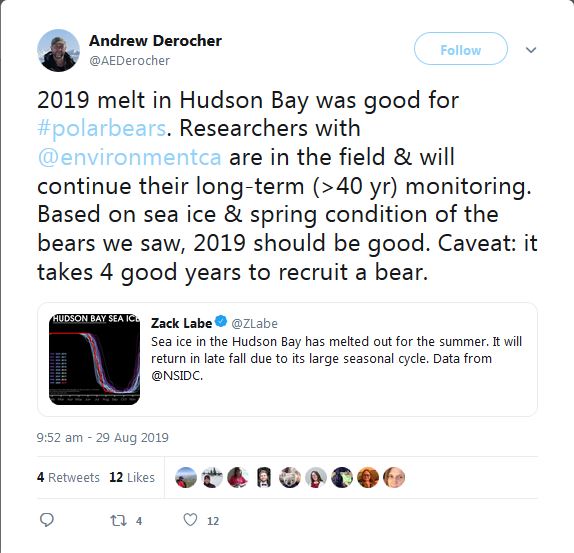
However, up to the summer of 2019, ice conditions for Western Hudson Bay bears had already been relatively good for the last five years and this year makes it six, since freeze-up in the fall of 2019 was earlier than the 1980’s average for the third year in a row.
How many recent years of sea ice data that does not support the ‘long term trend’ for Western Hudson Bay will change the mind of polar bear biologists? Already, the breakup and freeze-up data has not supported the assumed ever-declining trend if you looked at what’s happened since the late 1990s: the trend was found to be flat between 2001 and 2010 (Lunn et al. 2016) and from 1995-2015 (Castro de la Guardia et al. 2017). Add the unpublished data since 2015 and the slight declining trend since 1979 for the ice-free period (see below) used to support climate change extinction predictions (e.g. Stern and Laidre 2016; Regehr et. al. 2016) and the trend is likely to disappear altogether.

No wonder polar bear researchers have not published the breakup/freeze-up data and associated dates onshore/offshore for polar bears for Western Hudson Bay since 2015. They know it would utterly destroy the public narrative of a catastrophic future for polar bears that’s been pushed for almost two decades despite strong evidence to the contrary, as my most recent book describes.
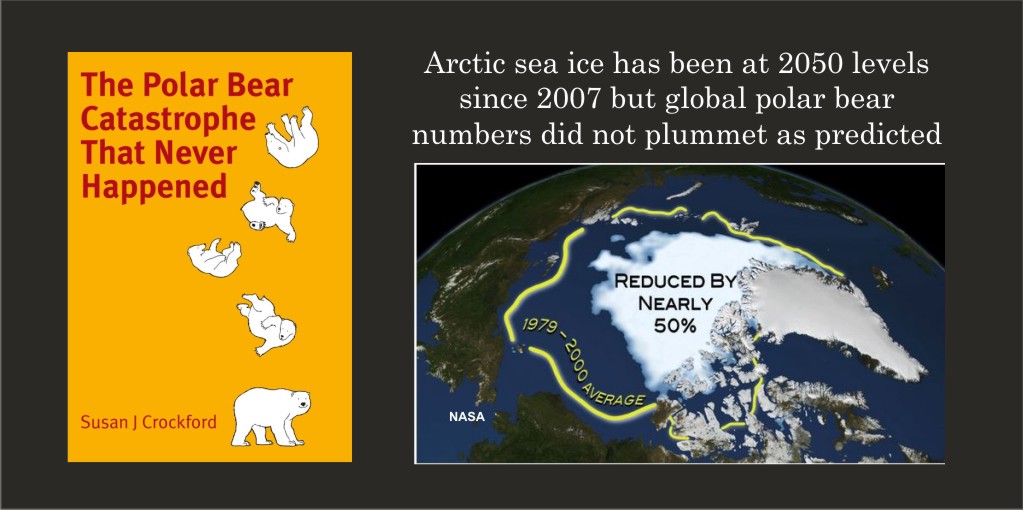
References
Castro de la Guardia, L., Myers, P.G., Derocher, A.E., Lunn, N.J., Terwisscha van Scheltinga, A.D. 2017. Sea ice cycle in western Hudson Bay, Canada, from a polar bear perspective. Marine Ecology Progress Series 564: 225–233. http://www.int-res.com/abstracts/meps/v564/p225-233/
Crockford, S.J. 2020. State of the Polar Bear Report 2019. Global Warming Policy Foundation Report 39, London. pdf here.
Lunn, N.J., Servanty, S., Regehr, E.V., Converse, S.J., Richardson, E. and Stirling, I. 2016. Demography of an apex predator at the edge of its range – impacts of changing sea ice on polar bears in Hudson Bay. Ecological Applications 26(5):1302-1320. DOI: 10.1890/15-1256
Regehr, E.V., Laidre, K.L, Akçakaya, H.R., Amstrup, S.C., Atwood, T.C., Lunn, N.J., Obbard, M., Stern, H., Thiemann, G.W., & Wiig, Ø. 2016. Conservation status of polar bears (Ursus maritimus) in relation to projected sea-ice declines. Biology Letters 12: 20160556. http://rsbl.royalsocietypublishing.org/content/12/12/20160556 Supplementary data here.
Stern, H.L. and Laidre, K.L. 2016. Sea-ice indicators of polar bear habitat. Cryosphere 10: 2027-2041.
Stirling, I., Lunn, N.J., Iacozza, J., Elliott, C. and Obbard, M. 2004. Polar bear distribution and abundance on the southwestern Hudson Bay coast during open water season, in relation to population trends and annual ice patterns. Arctic 57: 15–26.
Hooray for polar bears! It’s amazing how many LIV’s still think Polar Bears are endangered, simply because of all of the Agitprop.
Comments still broken, that’s a shame.
[Please elaborate further. How are comments broken? -mod]
At the time nothing was appearing, so I suppose there’s just a long delay. Doesn’t happen at any other sites, maybe you have to be more careful here. Still, it’s difficult to know for sure if you’ve posted anything or not.
I notice posts that lag tend to appear at the top of the hour.
It is a wordpress thang. Disqus has it, too, just usually not as long a delay.
More about polar bears, sea ice, and climate change.
https://tambonthongchai.com/2020/07/21/climate-change-vs-polar-bears/
It doesn’t matter.
They have a narrative and they’re going to keep bleating it, no matter the evidence.
The shorthand is “Four legs good! Two legs bad!”
What’s about birds ?
That polar bear is not “healthy” , it’s obese. It even makes BoJo look thin.
the next scare will be CO2 is making polar bears too fat !
Clearly ate an arctic climate scientist that was too slow.
Expecting triplets?
Related post
Is the demise of polar bears being exaggerated to keep extinction panic alive?
Is the Pope Catholic? Do bears sleep in the Woods? Can a fat baby …..
Great article, up to the last graphic wherein the embedded text threw me into a spin: “Arctic sea ice has been at 2050 levels since 2007 . . .”
Really? Possible explanations:
1) a typo (should be 2020?)
2) referencing someone’s (who’s?) computer modeled and predicted ice extent for 2050,
3) someone is using a time machine that I haven’t heard about.
Arctic sea ice has declined but the evidence does not show that the decline can be explained in terms of rising Arctic air temperature. Therefore not an agw thing.
https://tambonthongchai.com/2019/11/07/precipitous-decline-in-arctic-sea-ice-volume/
Gordon, the 2050 forecast ice reduction by bear guys in mid 2000s, was realized in 2012! This was not even welcomed by the bear alarmists because no clisci folk like conditions for calamitous events to arrive in their lifetimes unless their is a calamity with it. They have therefore gone into overdrive hype because they have to!
They are still refusing to publish on the recovering ice conditions data they collected over the past 6yrs. You can see by Derocher’s tweets that a ‘brief’ turnaround in ice is just an ‘anomaly’. The wishful thinking and hope for resumption of decline must bring a lot of pressure. The meanness of the bear guys in the face of this resulted in their enlisting Michael Mann to help them have Dr. Crockford fired from her job at University of Victoria, B.C. Shameful.
Gary, it is totally UNSCIENTIFIC to argue a point related to a pure forecast of a local climate parameter (i.e., Arctic sea ice extent) that someone asserts will be occurring 30-40 years in the future. It is as bad a casting chicken bones to establish what the price of oil will be 30 years from now.
“. . . has been at 2050 levels for . . .” is just plain rubbish. What about a comparison to levels in the year 2082, just to be fair?
Therefore, I was quite surprised to see such a claim in the noted graphic alongside the image of Susan Crockford’s book . . . I highly respect Ms. Crockford for her scientific acumen and practice in her studies of polar bears, and find it unbelievable that she herself would make reference to such a garbage claim about the future.
Susan Crockford didn’t make the 2050 prediction – Steve Amstrup did back in 2007. Your were thrown off because you weren’t aware of the reference – and the controversy over the predicted polar bear decline. (Read the book!)
Remember, every time you fly on a plane, you are sentencing a polar bear to a horrible, gruesome death:
https://www.youtube.com/watch?v=fxis7Y1ikIQ
Envirofascism at its finest.
Hmmm…. You might be onto something here, Bruce!
The reduced aircraft travel this spring, due to the Wuhan virus, correlates well with this years excellent Hudson Bay polar bear health. /s
Susan Crockford’s blog, where the item is posted, is https://polarbearscience.com/ not Climate Etc. which is Judith Curry’s blog.
Sept minimum sea ice has declined since 1979 but the evidence does not show that the decline can be explained in terms of global warming.
https://tambonthongchai.com/2019/11/07/precipitous-decline-in-arctic-sea-ice-volume/
The fact that the 70’s were the coldest period on this planet in the last 100 years just doesn’t matter to the alarmists.
So, with polar amplification (3x global average) of global temperatures on top of these observations, it’s clear that the global temperature charts should still show the 1930s – mid 40s as global highs as the long term Raw Temperature records show (N America, Europe, Southern Africa, Uruguay, Paraguay, Ecuador, etc. -Paul Homewood a good resource for this).
We know that when we experienced the super El Niño in 1998, Hansen’s GISS was disappointed that there was no new world record, something H was hungry for for a decade after his famous Washington D.C. speech. Indeed, the two decades of warming that the newly minted Catastrophic AGW was founded on was basically just a recovery from the 35yr temperature slide (Ice Age Cometh fears) from mid 1940s to late 70s.
Hansen only ‘arranged’ for 1998’s ‘elevation’ by pushing down the 1930s-40s hot peak down by 0.5°C in 2007, on the eve of his retirement (a similar eve of retirement fiddle was done in 2015 by Karl to erase the Dreaded Pause, which I termed the Karlization). H’s trick also neatly erased the deep 35yr cooling. BEST used its “discontinuity” slide-up algorithm to effect the same result.
In Feb 2019, Chicago and a number of places in nearby states broke all time cold temperatures
https://chicago.curbed.com/2019/1/31/18205171/cold-weather-record-rockford-illinois-temperatures-polar-vortex
The climate wroughters brazenly spun this as due to the weirding of the polar vortex, not adding that this frigid air was from an uncommonly cold Arctic that gave polar bears an extra month on the ice in spring.
I have been wondering when they are going to morph the claim into Polar Bears going extinct because there are too many for food chain to support. Do enough 180s and soon no one knows what you are saying. ;}
Is it not the case that Arctic ice follows the AMO and is today where it was in 1935? Start of satellite obs in 1979 is cherry picking. No-one has taken my £100 bet that ice will (again, again) bottom out above 4 million square kilometres third week in September. Less I pay you. Funny, that,
Thanks to Dr. Susan for an update on the CAGW Poster Chile: Polar Bears! I was personally thrilled to read “Perhaps the first bear of the western Hudson Bay ice…was in very good condition.” When I looked at the accompanying picture I immediately realized I also am in “very good condition”. Thanks!
The anomaly is the colder conditions in that part of Canada and the US in recent winters, restoring the Hudson sea ice. This is against the overall arctic trend.
Just as anomalous was sea ice reaching Svalbard before the new year last winter.
For the moment the sea ice is still at a record low for this date in July, though melt slowing (but with a big storm over the Beaufort). A reasonable chance to get ‘second lowest’ and some chance of a record lowest at season end.
So, once again, you screech “more polar bears BAD!!!!”. Got it, griffie.
For some reason, griff is fixated on this belief that prior to 1979, nothing happened in the arctic.
At least Greenland will have no problems:
Greenland ice: unusually low losses due to strong July snowfall
Any Question, griff ?
These are the last data as provided per today.
dramtical lost, I see 😀
2020, 07, 22, 6.330,
2020, 07, 23, 6.301,
2020, 07, 24, 6.311,
2020, 07, 25, 6.246,
2020, 07, 26, 6.204,
2020, 07, 27, 6.130,
2020, 07, 28, 6.222,
Source
According to griff, arctic ice is at record low levels, according to the data, most of the bears are still out at sea.
So either the bears are just kicking back and having a pool party, or there is more ice than griff wants to believe.
I’m not sure why SC is even arguing about sea ice extent since she has convincingly argued that it doesn’t have a huge impact on polar bear survival. Are you not legitimizing their flawed arguments when you argue about summer ice extent?
Can’t she do both?
The claim was there will be less or no ice and this hurts the bears.
But less ice is better for the bears and there is actually more ice than predicted anyway
So she is proving both sides of the claim wrong
Winning, in my estimation
Sop stories about ursus maritimus are usually accompanied by pics of cuddly bears and cubs.
Just ask the reader to have a good look at the pics and see how fat the animals are. Once that has been observed ask if those bears are starving or look endangered in any sense. Often the penny drops.
To play Devil’s advocate, the tweet about ‘one normal year’ may have been referring the date when most bears had come ashore. Nothing in the post counters the possibility that this was the first year in some time that only 3 bears were ashore this late in the year, and his other tweet mentioning behavioral elasticity would indicate that they normally only stay out when there is greater ice coverage.
Does Derocher give any data on the overall population, or is he just assuming that less ice has been bad for polar bears?
So there should be more polar bears in the years to come and thus more of them will die in the next decades …
It’s worse than I thought !
From the Mosaic diary July 26th:
Source, day July 26th
Andy Derocher is just channeling his Upton Sinclair denialism.
“It is difficult to get a man to understand something when his salary depends upon his not understanding it.”
— Upton Sinclair
Save the polar bears still sells well this high schoolers and college freshmen. Facts and factual updates don’t play any part in a good marketing strategy that is already set in motion.
Alarmists worry over the conditions and well-being of polar bears, but not a mention of their predations on the poor seals just going about their basic survival.
White privilege again!
Where will it stop?
Q: Where will it stop?
A: When all animals are equal, where some are more equal than others.
H/T: George Orwell’s Animal Farm
Socialism, and its more radical form Marxism, has Equality of Outcome as their core tenet. This drive for “equality of outcome” is the key lure for today’s Leftists and they use it to recruit minority groups in their divide and conquer strategy for power And they intend to use power of the State, if the People foolishly give it to them, to bring their version of equal misery to All, to wit: Venezuela.
That is All except a few liberal elites as they see themselves. Derocher just plays his part for a paycheck as their Useful Idiot. Orwell foretold all of this in his various literary works as he deeply understood the mental pathologies of Socialists.
Liberalism is truly a mental disorder.
I am not convinced that the Moasic research will produce much of value as they can not even identify the things you can count and things that can’t be counted.
“The amount of bears we are seeing”.
“Amount of ice” (one can’t count ice, just measure or estimate volume)
“Number of polar bears” See a bear, that’s 1, see another, that’s 2.
They may be Germans, in this case (texting) probably not the brightest light on the cake.
If the best years STILL predict demise of polar bears, then that’s really, really bad.
I notice that this blog has gone through several phases:
– climate change is bogus, man!
– ok, its changing, but that’s actually good!
– Models, don’t talk to me about Models!
– Ok, we are f*&ked, but its too late/expensive
– Russia isn’t so bad
oy
I know that you make it a point never to make any sense, but this post is a new low even for you.
First off, nobody said any of the nonsense that you claim.
Secondly, none of your bogus points are even related.
Where did you get the nut case notion that this is “the best years”. Didn’t you get the same memo that griffie poo did, that sea ice is at record low levels? That makes this the worst of years.
If polar bears are thriving during what your fellow travellers are calling the worst of years, then obviously they would do even better when the best of years returns. Either that or as actual scientists have pointed out, the bears don’t care much how much ice there is.
Despite the fact that your paid activists are still predicting the eminent demise of the poor Polar Bear, their numbers still continue to climb.
The quality of the trolls on WUWT seems to have declined. This one “chris” isn’t even coherent.
I notice he tried to slip in the Russia collusion fraud. What a pure hack idiot. These types can’t ever let go of their lives. Part of that narcissistic arrogance that defines them.
Hey Chris – got any more pure bullshit to project on us?
Wow, griffie, you really need to up your game. I suggest laying off the meth and liquor, you may wake up some day.
chris,
news flash. We’re still at “climate change is bogus, man!”
That’s because when we use the IPCC definition climate change, a definition restricted to of anthropogenic causes, it is bogus.